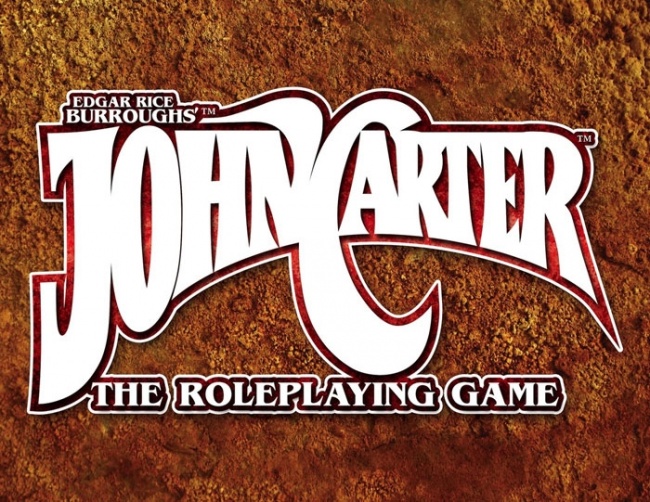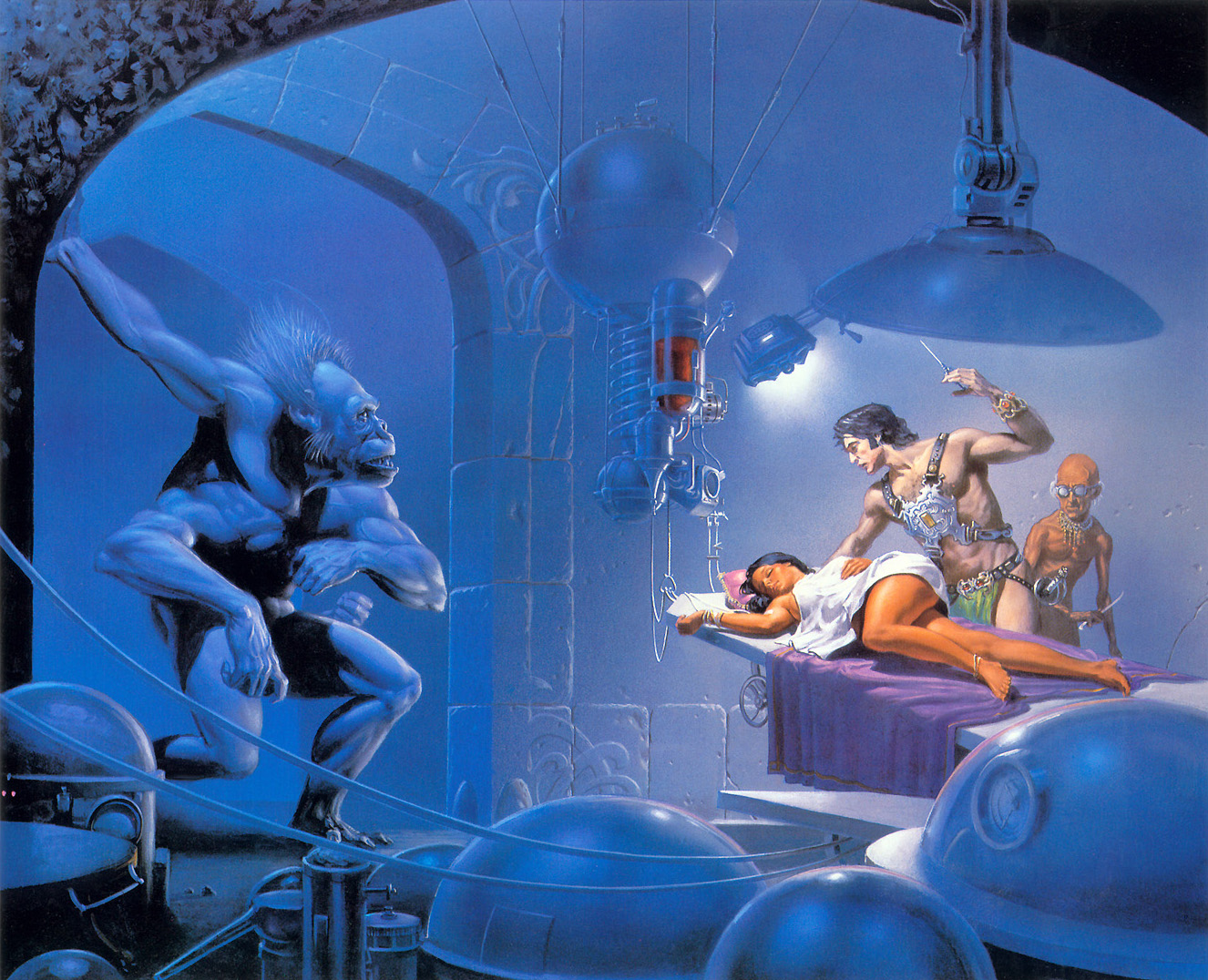John Carter/Barsoom in other media
Sept 4, 2016 16:33:13 GMT -5
Post by deuce on Sept 4, 2016 16:33:13 GMT -5
Saw this out on the Webz. Written by Abraham Sherman:
Both the Asylum’s “Princess of Mars” film and Disney’s “John Carter” film modernized the character of John Carter in different ways. I respect Antonio Sabato Jr. for being the first onscreen John Carter. He did a good job with the character as written. Taylor Kitsch likewise did well with the version of the character he was given.
But due to those modernizations, we have yet to see ERB's John Carter, or ERB's Barsoom. Modernizing John Carter puts a whole different spin on the world he encounters. Either the planet must be changed into something divorced from ERB to suit the arc of the modern main character, or a modern man takes too long to "get" the chivalry and culture of Barsoom, putting him out of touch with the central conflicts of the planet for too much of the story. The main character should have some questions, some issues to resolve, but he should engage in the world at hand as quickly as possible, so we can go along with him in exploring that world and caring about it as soon as possible.
The refusing-the-call phase of the hero's journey needs a non-traditional rendering in a setting like Barsoom, where to be there is to be in the midst of the conflict. There are no caves of refuge on Barsoom - nowhere to escape to think things over. Even the fortified atmosphere plant has an air of fragility. At the beginning of the stories, practically everyone is in a kill-or-be-killed situation. John Carter's character arc should be something other than a struggle to engage in the world. A Barsoom film is at least as much about the planet as it is about John Carter, and a modernized hero creates unnecessary complications for the connection between the planet and the man.
Taylor Kitsch's John Carter was a Civil War veteran, same as ERB's character, but modernization was nonetheless introduced via his cynical, disengaged perspective toward war. This seemed designed to resonate with modern anti-war sentiments. The John Carter of the books would recognize the bad guys from the good guys quickly, and jump into the fight with everything he has in order to end the conflict as quickly as possible. He would view reluctance to fight as something which would only prolong the conflict and multiply its horrors.
The John Carter of the books would consider the differences between the Tharks and Warhoons, and Helium and Zodanga, and fight for Thark and Helium even if he never met Dejah Thoris. Of course, the romance is primary in the books, but he never would have pursued Dejah Thoris if he had found her to have dishonorable character. His "old-fashioned" moral judgements get the veto over his passions; in the case of Dejah Thoris his morals and his passions lined up, which is why he is so devoted to her.
Barsoom isn't about today, nor should it be. It's about the aspects of humanity which were the same yesterday, and will be the same tomorrow. Too much of "today," and the mirror will be too flatteringly distorted to show us our true reflections.
J.R.R. Tolkien, the creator of The Lord of the Rings, wrote to create a myth for the Anglo-Saxon race, structured around his love of languages. He did it well enough that people of all races can enjoy his work.
Edgar Rice Burroughs, the creator of Tarzan and John Carter of Mars, wrote to feed his family and to entertain. With Barsoom, he gave his uniquely brilliant imagination free reign, and ended up inspiring scientists, science fiction, and the modern age of mythic heroism. We owe the 80-years-and-going-strong fervor surrounding superheroes to ERB - if Jerry Siegel, the creator of Superman, is to be believed.
Just as no amount of excellent fantasy writing has diminished Tolkien's works in the least, neither have decades of science fiction and superheroes diminished ERB's works. We will never get enough of the men and women of yesterday and tomorrow, the heroes who would demonstrate the same character on Mount Olympus as on an alien planet.
Why Barsoom? Why go back to the beginning of science fiction and superheroes as we know them? Because today's fire, no matter how aggressive and how hot it has burned, has not shone brighter than the lightning which ignited it. John Carter remains an ageless man, and Barsoom a world apart.
Both the Asylum’s “Princess of Mars” film and Disney’s “John Carter” film modernized the character of John Carter in different ways. I respect Antonio Sabato Jr. for being the first onscreen John Carter. He did a good job with the character as written. Taylor Kitsch likewise did well with the version of the character he was given.
But due to those modernizations, we have yet to see ERB's John Carter, or ERB's Barsoom. Modernizing John Carter puts a whole different spin on the world he encounters. Either the planet must be changed into something divorced from ERB to suit the arc of the modern main character, or a modern man takes too long to "get" the chivalry and culture of Barsoom, putting him out of touch with the central conflicts of the planet for too much of the story. The main character should have some questions, some issues to resolve, but he should engage in the world at hand as quickly as possible, so we can go along with him in exploring that world and caring about it as soon as possible.
The refusing-the-call phase of the hero's journey needs a non-traditional rendering in a setting like Barsoom, where to be there is to be in the midst of the conflict. There are no caves of refuge on Barsoom - nowhere to escape to think things over. Even the fortified atmosphere plant has an air of fragility. At the beginning of the stories, practically everyone is in a kill-or-be-killed situation. John Carter's character arc should be something other than a struggle to engage in the world. A Barsoom film is at least as much about the planet as it is about John Carter, and a modernized hero creates unnecessary complications for the connection between the planet and the man.
Taylor Kitsch's John Carter was a Civil War veteran, same as ERB's character, but modernization was nonetheless introduced via his cynical, disengaged perspective toward war. This seemed designed to resonate with modern anti-war sentiments. The John Carter of the books would recognize the bad guys from the good guys quickly, and jump into the fight with everything he has in order to end the conflict as quickly as possible. He would view reluctance to fight as something which would only prolong the conflict and multiply its horrors.
The John Carter of the books would consider the differences between the Tharks and Warhoons, and Helium and Zodanga, and fight for Thark and Helium even if he never met Dejah Thoris. Of course, the romance is primary in the books, but he never would have pursued Dejah Thoris if he had found her to have dishonorable character. His "old-fashioned" moral judgements get the veto over his passions; in the case of Dejah Thoris his morals and his passions lined up, which is why he is so devoted to her.
Barsoom isn't about today, nor should it be. It's about the aspects of humanity which were the same yesterday, and will be the same tomorrow. Too much of "today," and the mirror will be too flatteringly distorted to show us our true reflections.
J.R.R. Tolkien, the creator of The Lord of the Rings, wrote to create a myth for the Anglo-Saxon race, structured around his love of languages. He did it well enough that people of all races can enjoy his work.
Edgar Rice Burroughs, the creator of Tarzan and John Carter of Mars, wrote to feed his family and to entertain. With Barsoom, he gave his uniquely brilliant imagination free reign, and ended up inspiring scientists, science fiction, and the modern age of mythic heroism. We owe the 80-years-and-going-strong fervor surrounding superheroes to ERB - if Jerry Siegel, the creator of Superman, is to be believed.
Just as no amount of excellent fantasy writing has diminished Tolkien's works in the least, neither have decades of science fiction and superheroes diminished ERB's works. We will never get enough of the men and women of yesterday and tomorrow, the heroes who would demonstrate the same character on Mount Olympus as on an alien planet.
Why Barsoom? Why go back to the beginning of science fiction and superheroes as we know them? Because today's fire, no matter how aggressive and how hot it has burned, has not shone brighter than the lightning which ignited it. John Carter remains an ageless man, and Barsoom a world apart.










